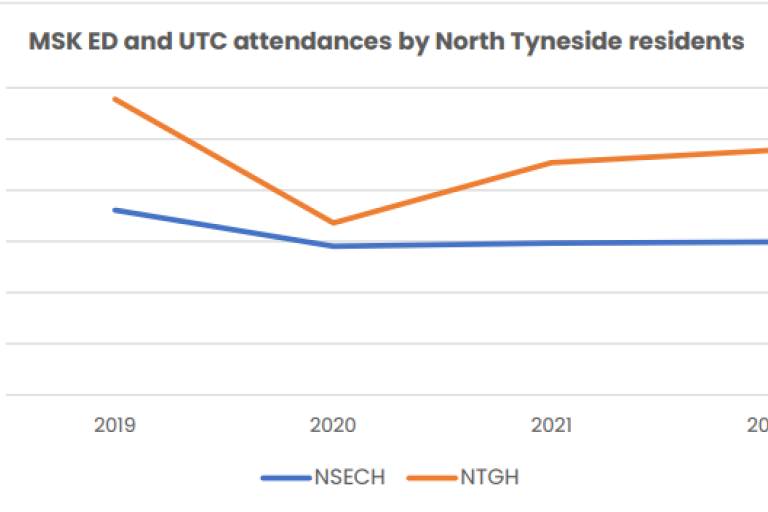Community assets and services
Within North Tyneside, there are several services to support MSK health. Healthcare services can offer a combination of medication and non-drug-based treatments, but severe cases may need surgery.
In 2022 there were 7,763 attendances by North Tyneside residents at the Urgent Treatment Centre (UTC) at North Tyneside General Hospital (NTGH) in North Sheilds or Emergency Department (ED) at Northumbria Specialist Emergency Care Hospital (NSECH) where the presenting complaint or diagnosis code appears linked to MSK issues, with almost 62% of these at NTGH. This is a slight increase on the previous year, but still lower than pre-pandemic levels, as shown in Figure 6 below. Overall, in 2022, more ED and UTC MSK attendances were for MSK pain and long-term conditions rather than injuries e.g. backpain, knee pain, sciatica, osteoarthritis. However, there were over 200 attendances due to a fractured neck of femur (e.g. broken hip).
Figure 6 – MSK attendances at NSECH ED and NTGH UTC, 2019-2022
data provided by NENC ICB

The North Tyneside Integrated Musculoskeletal Service (NTIMS) is part of Northumbria Healthcare NHS Foundation Trust (NHCT) and offers a complete assessment and treatment service for MSK problems. Services are delivered from North Tyneside General Hospital and five clinics in the community. Residents can self-refer or be referred by primary care for treatment and assessment. Physiotherapists and specialist clinicians deliver a range of treatments, including group and solo sessions and surgery.
Current data held by commissioners suggests that demand for NTIMS is increasing, particularly with self-referrals. In the 12 months from October 2022 to October 2023
there were over 25,000 new and review appointments delivered by the service. The most common reason for referral was knee pain, followed by lumbar spine issues, shoulder pain, hip pain and wrist/hand pain.
Data held by the service suggests that the rate of appointments in 2023 peaked for patients aged 60-69 and 70-79. Rates were higher in females than males for all age groups except 90+. There is no clear pattern by deprivation; there were higher rates in people from the 20% most deprived parts of the Borough compared to the 20% least deprived but the highest rates were people with postcodes in the 40-60% most deprived areas (e.g. those neither classed as most deprived or least deprived). Wardlevel data suggests there were fewer appointments with people from wards with lower levels of deprivation.
The service and commissioners monitor various waiting targets. Despite increasing demand, there is a gradual improving trend with these indicators, even those not currently to target. Patient experience is monitored on a quarterly basis and is broadly positive. Negative feedback tends to focus on waiting times and other delays.
As above, severe MSK issues require surgery. According to the National Joint Registry there were over 3,300 procedures carried out by NHCT to replace a joint, with over 3,000 of these for hip and knee replacements. Not all of these were carried out on North Tyneside residents, but over 630 procedures were carried out at North Tyneside General Hospital. In the same period, Newcastle upon Tyne Hospitals NHS Foundation Trust also carried out over 1,000 procedures and Newcastle Nuffield Hospital carried out over 900.
As above, there are also a range of other services in the Borough, such as private physiotherapists, acupuncturists, and support groups etc.
